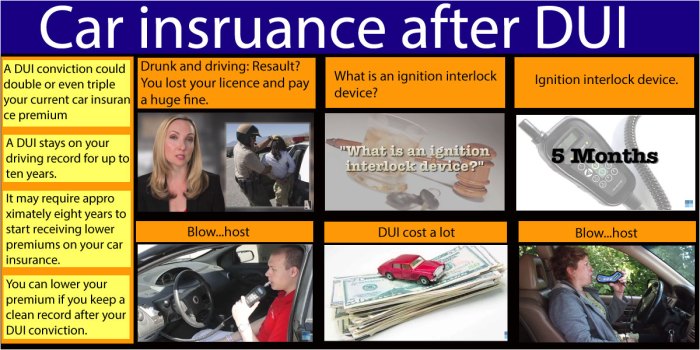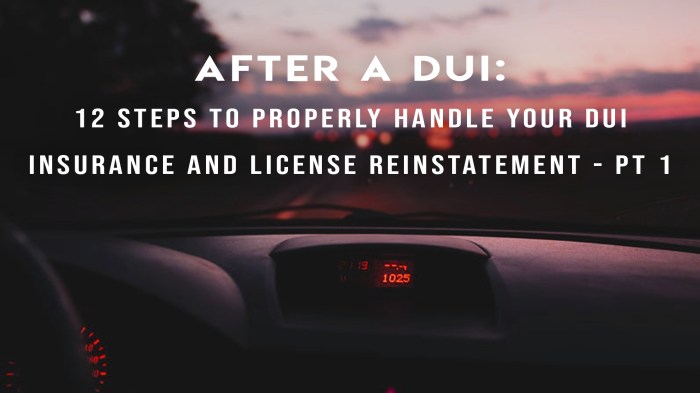Concealing a DUI from your insurance provider carries significant legal and financial repercussions. Many drivers, facing the immediate aftermath of a drunk driving arrest, mistakenly believe they can avoid the consequences by remaining silent. This omission, however, can trigger a cascade of problems far exceeding the initial penalties for the DUI itself, potentially leading to hefty fines, legal battles, and severely compromised insurance coverage.
This article delves into the intricate web of legal ramifications, insurance policy implications, and ethical considerations associated with not disclosing a DUI. We’ll explore the varying penalties across states, the impact on premiums and coverage, and the long-term financial burden of deception. We’ll also examine the role of insurance agents and the strategies for honest disclosure, ultimately aiming to provide a comprehensive understanding of the risks involved.
Legal Ramifications of Concealing a DUI

Failing to disclose a DUI conviction to your insurance provider carries significant legal and financial repercussions. The act of omission constitutes insurance fraud, a serious offense with potentially severe penalties. These penalties vary widely depending on state laws and the specifics of the case, ranging from hefty fines to criminal prosecution. Understanding these ramifications is crucial for anyone facing this situation.The potential legal consequences of not disclosing a DUI to an insurance company stem from the principle of good faith and fair dealing inherent in insurance contracts.
Insurers rely on accurate information from applicants to assess risk and set premiums. Withholding information about a DUI, a significant risk factor for future accidents, directly violates this principle. This breach of contract can lead to a range of penalties, depending on the jurisdiction and the insurer’s policies.
State Variations in Penalties for Non-Disclosure
Penalties for failing to disclose a DUI to insurance providers vary significantly across different states. Some states may impose administrative penalties, such as increased premiums or policy cancellation. Others may pursue more severe legal action, including criminal charges for insurance fraud. The severity of the penalties often depends on factors such as the number of DUI convictions, the timing of the non-disclosure, and the insurer’s specific policies.
For instance, a first-time DUI offender might face a higher premium, while a repeat offender could face criminal charges. Additionally, some states have stricter laws regarding insurance fraud than others. A comprehensive review of the relevant state statutes is essential to understand the potential consequences.
Examples of Severe Repercussions from Non-Disclosure
Non-disclosure of a DUI can lead to severe consequences that extend far beyond increased insurance premiums. Consider the following scenarios:Scenario 1: An individual fails to disclose a DUI conviction when applying for car insurance. Years later, the insurer discovers the omission during a routine audit or after a subsequent accident. The insurer may cancel the policy retroactively, leaving the individual responsible for any accident-related costs.
Furthermore, the individual could face criminal charges for insurance fraud, leading to fines, imprisonment, and a criminal record.Scenario 2: A business owner, unaware of the implications, fails to disclose a DUI on their commercial auto insurance application. Following an accident involving a company vehicle, the insurance company investigates and discovers the undisclosed DUI. In addition to policy cancellation and financial penalties, the business owner could face reputational damage, impacting their business operations and relationships with clients.
This could potentially lead to the loss of contracts and business failure.
Insurance Policy Implications

Failing to disclose a DUI conviction to your insurance provider carries significant financial and legal risks. Most standard auto insurance policies contain clauses that explicitly address the impact of driving under the influence, leading to potential policy cancellations, increased premiums, and denial of claims. Understanding these clauses and their ramifications is crucial for anyone involved in a DUI incident.Most insurance policies include a section requiring applicants to truthfully disclose all relevant information pertaining to their driving history, including traffic violations and convictions.
This typically involves answering questions about any driving-related incidents within a specified timeframe, often the past three to five years. Failure to accurately and completely answer these questions constitutes a material misrepresentation, which can invalidate the entire policy.
Policy Coverage After a DUI
Omitting a DUI from an insurance application directly impacts coverage. Should an accident occur after the omission, the insurer may deny coverage entirely, leaving the policyholder responsible for all damages and liabilities. Even if coverage isn’t completely denied, the insurer may significantly reduce the amount paid out, leaving the policyholder to cover the difference. This could include expenses for medical bills, property damage, and legal fees stemming from the accident.
For example, if an individual is involved in a collision and fails to disclose a prior DUI, the insurance company may argue that the DUI was a contributing factor to the accident, thus reducing or eliminating their liability. This is especially true if the accident involves alcohol or impaired driving.
Premium Increases Following Disclosure Versus Concealment
Honest disclosure of a DUI conviction, while resulting in higher premiums, offers a degree of protection. Insurers will typically increase premiums based on the severity of the offense and the individual’s driving record. However, this increase is predictable and manageable, allowing the policyholder to budget accordingly. Concealment, on the other hand, carries the risk of far more severe consequences.
If the DUI is later discovered, the insurer may not only significantly increase premiums retroactively but also cancel the policy entirely, leaving the individual without coverage and potentially facing significant financial repercussions. A hypothetical example: an individual who conceals a DUI might see their premiums double or triple once the insurer discovers the omission, compared to a more moderate increase if they had disclosed the information initially.
Consequences of Honest Disclosure Versus Concealment
The contrast between honest disclosure and concealment is stark. Honest disclosure, while leading to higher premiums, maintains the validity of the insurance policy and protects the policyholder from the much more severe consequences of policy cancellation and potential legal action for fraud. Concealment, however, exposes the policyholder to a much higher level of risk, potentially leading to far greater financial losses, legal battles, and a damaged credit history.
The long-term cost of concealment often far outweighs the short-term cost savings of avoiding a premium increase. In essence, truthfulness, though initially more expensive, provides far greater financial and legal security in the long run.
Financial Burden of Non-Disclosure
Concealing a DUI from your insurance provider carries significant financial risks that extend far beyond the immediate cost of premiums. The potential for substantial financial losses, stemming from accidents and subsequent legal action, underscores the gravity of this decision. Failing to disclose this information can lead to a cascade of unforeseen expenses, impacting your financial stability for years to come.The increased costs associated with potential lawsuits following an accident are considerable.
If you are involved in a collision and your non-disclosure is discovered, the insurance company may deny your claim entirely. This leaves you personally liable for all damages, including medical bills for injured parties, property repairs, and potentially significant legal fees. Such legal battles can be protracted and expensive, potentially draining your savings and impacting your credit rating. Furthermore, judgments against you could result in wage garnishment or the seizure of assets.
Increased Insurance Premiums and Legal Costs Following Accident
The following table illustrates a hypothetical comparison of insurance premiums and potential legal costs, highlighting the financial disparity between disclosing and concealing a DUI. These figures are illustrative and vary widely depending on location, driving record, and the specifics of the accident. However, they demonstrate the potential magnitude of the financial burden.
| Scenario | Annual Premium (Pre-Accident) | Annual Premium (Post-Accident – Disclosure) | Annual Premium (Post-Accident – Non-Disclosure) | Potential Legal Costs (Non-Disclosure) |
|---|---|---|---|---|
| Good Driving Record | $1,200 | $2,000 – $3,000 | $0 (Claim Denied) | $10,000 – $50,000+ |
| Prior Minor Violations | $1,500 | $2,500 – $4,000 | $0 (Claim Denied) | $15,000 – $75,000+ |
Long-Term Financial Impact of Concealment
Consider the scenario of John, a 35-year-old with a previously clean driving record. He is involved in an accident after concealing a DUI from his insurer. His insurance company denies his claim, leaving him liable for $30,000 in damages. Legal fees add another $15,000 to his debt. Beyond the immediate financial strain, his credit score plummets, making it difficult to secure loans or even rent an apartment.
His insurance premiums, even if he eventually discloses the DUI, will remain significantly higher for years, potentially costing him tens of thousands of dollars over the life of his policy. The long-term repercussions of his non-disclosure are substantial and far-reaching. This case highlights the pervasive and long-lasting financial consequences of concealing a DUI from an insurance provider.
Ethical Considerations
Concealing a DUI from an insurance company presents a significant ethical dilemma, raising questions about honesty, fairness, and the responsibility individuals have to act with integrity in their dealings with others. The act of omission, failing to disclose material information, is arguably as ethically problematic as an outright lie. This is particularly true in the context of insurance, where accurate information is crucial for the proper functioning of the risk assessment and pricing mechanisms.The ethical implications stem from the fundamental principle of good faith and fair dealing inherent in insurance contracts.
Insurance companies rely on the honesty of their policyholders to accurately assess risk and set premiums accordingly. By withholding information about a DUI, the policyholder is actively undermining this principle, potentially leading to unfair financial advantages for themselves and a distortion of the insurance market as a whole. This breach of trust erodes the very foundation upon which the insurance system operates.
Impact on Trust and Relationships with Insurance Providers
Withholding information about a DUI severely damages the trust between the policyholder and the insurance provider. This breach of trust can have long-term consequences, extending beyond the immediate financial implications. Future applications for insurance may be met with increased scrutiny, potentially resulting in higher premiums or even denial of coverage. The damaged relationship can make it difficult to secure favorable terms in the future, even for unrelated insurance products.
A history of dishonesty can follow the individual, affecting their ability to obtain insurance at competitive rates across different providers. In essence, the short-term gain of concealing the DUI can lead to long-term disadvantages in accessing essential financial services.
Comparison with Other Forms of Deception
The ethical dilemma of concealing a DUI is comparable to other forms of deception involving financial transactions. For instance, it shares similarities with tax evasion, where individuals intentionally withhold information to reduce their tax liability. Both actions involve a deliberate attempt to gain an unfair advantage by manipulating a system designed to operate on principles of honesty and transparency.
Similarly, the ethical implications resonate with those involved in fraudulent claims, where individuals falsely represent information to obtain insurance payouts they are not entitled to. In all these instances, the common thread is a disregard for the ethical principles of fairness, honesty, and respect for the established systems. The consequences, whether legal or reputational, can be significant and far-reaching.
The Role of Insurance Agents

Insurance agents occupy a critical position in the process of obtaining and maintaining auto insurance. Their responsibilities extend beyond simply selling policies; they are also entrusted with ensuring the accuracy and completeness of the information provided by their clients. This includes the accurate reporting of driving history, a crucial aspect that significantly impacts risk assessment and premium calculation.
Failure to properly address this responsibility can have serious consequences for both the agent and the client.The primary responsibility of an insurance agent regarding client disclosure is to diligently gather all relevant information necessary for accurate risk assessment. This includes explicitly questioning clients about their driving records, including any past DUI convictions or accidents. Agents are obligated to ensure that all information provided on insurance applications is truthful and complete.
This obligation stems from both ethical considerations and the legal ramifications associated with misrepresentation or omission of material facts. Insurance companies rely heavily on the information provided by agents to underwrite policies and accurately price risk.
Consequences for Agents in Cases of Client Concealment
If a client conceals a DUI from an insurance agent, the consequences for the agent can be severe. Depending on the specific circumstances and the agent’s level of involvement, these consequences can range from disciplinary action by their licensing board to legal liability. An agent might face fines, suspension, or even revocation of their license if found to have knowingly facilitated the submission of a fraudulent application.
Furthermore, the insurance company might pursue legal action against the agent for negligence or complicity in fraud. This could result in significant financial penalties and reputational damage. In cases where the agent actively colluded with the client to conceal the DUI, criminal charges might be filed. The severity of the penalties will depend on factors such as the agent’s state of knowledge, the extent of their involvement, and the financial losses incurred by the insurance company.
Situations Suggesting Potential Client Dishonesty
Several situations might raise an agent’s suspicion regarding a client’s honesty. For example, inconsistencies between information provided by the client and publicly available records (such as DMV reports) would be a major red flag. Similarly, a client’s evasiveness or reluctance to answer direct questions about their driving history should trigger further investigation. A significant discrepancy between the client’s stated driving experience and the premiums quoted by the insurance company could also indicate potential misrepresentation.
Another situation might involve a client attempting to minimize the severity of a past accident or traffic violation. Finally, if a client exhibits unusually high levels of anxiety or defensiveness when discussing their driving record, it could signal an attempt to conceal negative information. In such cases, agents are obligated to exercise due diligence and take appropriate steps to verify the information provided by their clients.
Impact on Future Insurance Applications
Securing affordable auto insurance after a DUI conviction, particularly one concealed from an insurer, presents significant challenges. The process differs dramatically depending on whether the prior DUI was disclosed. Transparency, while initially difficult, ultimately leads to a more straightforward path toward obtaining coverage. Conversely, concealing a DUI creates a minefield of potential problems that can significantly impact future insurance applications and premiums.The process of obtaining insurance after a DUI conviction involves several key steps.
First, the applicant must complete a comprehensive application, disclosing all relevant driving history, including any accidents, traffic violations, and, crucially, DUI convictions. Insurance companies use sophisticated algorithms and databases to verify this information. Failure to disclose a prior DUI, even if it was from many years ago, will likely lead to policy cancellation and potential legal repercussions if discovered later.
With full disclosure, insurers assess the risk based on the severity of the offense, the driver’s history, and other factors, ultimately determining the premium. This contrasts sharply with the situation where a DUI is concealed, which dramatically increases the risk for the insurer should it be discovered later. The insurer is then faced with a breach of contract, potentially leading to legal action and substantial financial losses.
Securing Affordable Insurance After a DUI
Following a DUI conviction, obtaining affordable insurance requires a proactive and strategic approach. Several strategies can help mitigate the increased premiums associated with a DUI. These include maintaining a clean driving record post-conviction, completing a court-mandated alcohol treatment program, and considering a high-risk insurer specializing in drivers with DUI convictions. Some insurers may offer discounts for completing defensive driving courses or installing vehicle telematics devices that monitor driving behavior.
Shopping around and comparing quotes from multiple insurers is also crucial. It’s essential to be upfront and honest about the DUI conviction with each insurer, as failure to do so could have severe consequences.
Challenges Faced by Individuals with a History of Concealed DUIs
Individuals with a history of concealed DUIs face exceptionally difficult challenges in obtaining insurance. The consequences extend beyond higher premiums. Once a concealed DUI is discovered, insurers may refuse coverage altogether, leaving the individual uninsured and vulnerable to significant financial penalties. This could include substantial fines, license suspension, and even legal action from the insurer for fraud.
Furthermore, obtaining insurance in the future will be significantly more challenging, as insurers will view the concealment as a demonstration of a lack of trustworthiness and increased risk. The impact can be long-lasting, potentially affecting the individual’s ability to obtain auto loans or other forms of credit. In some cases, the individual may need to wait several years and demonstrate a significant period of clean driving history before an insurer will consider offering coverage.
The financial burden of this situation is substantial and can have long-term consequences on personal and professional life.
Comparative Analysis of State Laws
The ramifications of failing to disclose a DUI to an insurance provider vary significantly across the United States, highlighting the importance of understanding specific state regulations. These differences extend beyond simple penalties and encompass the legal processes involved, impacting both the insured and the insurer. A comparative analysis reveals a complex patchwork of laws, reflecting diverse approaches to risk assessment and consumer protection.
DUI Disclosure Requirements and Penalties in California, Texas, and New York
This section compares and contrasts the legal frameworks governing DUI disclosure in California, Texas, and New York, three states representing different legal traditions and population densities. These examples illustrate the wide range of approaches taken across the country.California mandates full disclosure of any DUI conviction or related offenses on insurance applications. Failure to disclose can lead to policy voidance, even if the accident is unrelated to the DUI.
Penalties can include significant financial repercussions, such as having to pay for past claims retroactively, and potential legal action from the insurer. The state’s Department of Motor Vehicles also maintains a record of DUI convictions, which insurers often access.Texas also requires applicants to disclose DUI convictions. However, the consequences of non-disclosure might vary depending on the specific wording of the insurance policy and the timing of the DUI relative to the application.
While policy voidance remains a possibility, the legal recourse available to the insurer may differ from California’s approach, potentially leading to less stringent penalties in some instances. The emphasis on the specific policy language is crucial.New York, unlike California and Texas, may not explicitly state the need for DUI disclosure in the same direct manner. However, insurers in New York have the right to void policies if they discover material misrepresentations, and a DUI conviction certainly qualifies as such.
The legal process might involve a more extensive investigation by the insurer to establish the connection between the non-disclosure and the subsequent claim. The penalties, therefore, might be similar in severity to those in California and Texas, though the path to those penalties may differ.
Variations in Legal Ramifications Across Jurisdictions
The legal ramifications of failing to disclose a DUI to an insurer extend beyond simple policy voidance. In some states, insurers might pursue legal action to recover losses incurred due to the non-disclosure, potentially leading to substantial financial liabilities for the insured. The legal processes vary, with some states favoring arbitration, while others rely on court proceedings. Furthermore, the burden of proof often rests on the insurer to demonstrate the causal link between the non-disclosure and the subsequent claim.
This can be a complex and costly undertaking for the insurance company.
Common Trends and Discrepancies in State Regulations
A common trend across all states is the insurer’s right to void a policy based on material misrepresentation. However, the specific definitions of “material misrepresentation” and the procedures for establishing it vary widely. Some states have stricter laws regarding the timeframe within which a DUI must be disclosed, while others focus more on the severity of the offense.
Discrepancies also exist in the types of penalties insurers can impose, ranging from policy cancellation to legal action for damages. The lack of uniformity across state regulations underscores the need for individuals to thoroughly understand the specific requirements in their jurisdiction.
Case Studies of Non-Disclosure

Concealing a DUI from an insurance company carries significant risks, as illustrated by several real-world cases and hypothetical scenarios. The consequences, ranging from policy cancellation to legal action, underscore the importance of transparency. The following examples highlight the potential financial and legal repercussions faced by individuals who chose not to disclose their DUI convictions.
Case Study 1: The Contractor’s Claim
John Smith, a contractor with a successful small business, was involved in a minor car accident a year after a DUI conviction. He failed to disclose the DUI on his insurance application, believing the incident was far enough in the past. When his insurance company investigated the accident and discovered the undisclosed DUI, they immediately voided his policy, leaving him liable for the full cost of the accident repairs and facing potential legal action from the other driver.
The cost of rectifying the situation, including higher premiums on future policies, far exceeded the initial cost of admitting the DUI to his insurer. His business suffered reputational damage due to the negative publicity surrounding the case.
Case Study 2: The Student’s Dilemma
Sarah Jones, a college student, received a DUI during her spring break. Worried about the impact on her car insurance premiums, she omitted the DUI from her renewal application. When her insurer discovered the DUI through a routine background check during a claim for unrelated damage to her vehicle, they cancelled her policy and refused to pay for the damages.
Sarah was forced to pay out of pocket for the repairs and faced significantly higher premiums on her future insurance policies. This financial burden caused considerable stress, affecting her academic performance.
Case Study 3: The Hypothetical Scenario – The Executive’s Deception
Consider the hypothetical case of Robert Brown, a high-earning executive. Mr. Brown, driving under the influence, was involved in a serious accident causing significant injury to another party. To avoid potentially exorbitant insurance premiums or policy cancellation, he concealed his DUI conviction from his insurer. However, during the subsequent legal proceedings related to the accident, his DUI conviction came to light.
Besides facing criminal penalties and civil lawsuits, he also faced severe reputational damage, impacting his career and financial stability. The cost of legal representation and potential settlements far surpassed the potential increase in insurance premiums had he been truthful.
Summary of Cases
| Case | Individual | Concealed Information | Outcome |
|---|---|---|---|
| 1 | John Smith (Contractor) | DUI conviction | Policy voided, liable for accident costs, higher future premiums, reputational damage |
| 2 | Sarah Jones (Student) | DUI conviction | Policy cancelled, out-of-pocket expenses for repairs, significantly higher future premiums |
| 3 | Robert Brown (Executive – Hypothetical) | DUI conviction | Criminal penalties, civil lawsuits, reputational damage, high legal costs |
Strategies for Disclosure
Disclosing a DUI to your insurance provider is a critical step in mitigating long-term financial and legal consequences. While it’s undeniably difficult, proactive and honest disclosure demonstrates responsibility and can lead to more favorable outcomes than attempting to conceal the incident. The process requires careful planning and precise communication to minimize potential negative impacts on your insurance premiums.The steps involved in disclosing a DUI to your insurer are straightforward but require meticulous attention to detail.
First, gather all relevant documentation, including the court records, police report, and any related legal paperwork. Next, contact your insurance provider directly—avoiding email or online portals initially—to explain the situation. Be prepared to provide all necessary details accurately and concisely. It is crucial to be honest and upfront, acknowledging the severity of the offense and expressing remorse.
Finally, review any changes to your policy and understand the implications of the disclosure on your future premiums.
Effective Communication Techniques
Effective communication is paramount during this process. Avoid jargon and technical legal terms; instead, use clear and simple language to explain the events. Focus on taking responsibility for your actions and demonstrating a commitment to rehabilitation, such as attending DUI classes or undergoing substance abuse treatment. Highlight any positive steps you’ve taken since the incident, like maintaining a clean driving record or participating in community service.
A sincere and contrite tone will resonate more effectively than defensiveness. Remember, the goal is to present yourself as a responsible individual who is committed to making amends.
Available Resources and Support Systems
Individuals facing the aftermath of a DUI often benefit from access to support systems. Many organizations offer resources to help individuals navigate the legal and insurance implications of a DUI conviction. These resources may include legal aid societies that can provide guidance on navigating the legal system, and support groups that offer peer support and guidance on maintaining sobriety.
Furthermore, some insurance companies offer programs to assist policyholders in managing the consequences of DUI convictions, including guidance on how to disclose the incident to their insurer. Seeking professional help, such as from a therapist or counselor, can also be beneficial in addressing the underlying issues that contributed to the DUI. These resources can provide crucial support during a challenging time and help individuals regain control over their lives.
Long-Term Effects on Driving Records

A DUI conviction casts a long shadow, impacting driving privileges and insurance rates for years, even decades, to come. The severity of the consequences varies depending on factors such as the driver’s blood alcohol content (BAC), prior offenses, and the specific state laws. Understanding these long-term effects is crucial for individuals facing DUI charges and those seeking to rebuild their driving records.The consequences extend far beyond the immediate suspension of driving privileges.
Increased insurance premiums, potential license revocation, and difficulty securing employment in certain fields are all possible ramifications. The impact on one’s ability to maintain a car, commute to work, and participate fully in daily life should not be underestimated. The financial burdens, emotional stress, and social stigma associated with a DUI can have a profound and lasting impact.
Restoring Driving Privileges After a DUI Conviction
The process of restoring driving privileges after a DUI conviction varies significantly by state. Generally, it involves completing a period of license suspension, fulfilling court-mandated requirements (such as attending alcohol education classes, completing community service, and/or undergoing substance abuse treatment), and potentially paying fines and fees. Some states may require the installation of an ignition interlock device (IID) in the driver’s vehicle, preventing operation unless the driver provides a breath sample with a BAC below a pre-set limit.
Reinstatement often requires a formal application to the state’s Department of Motor Vehicles (DMV) or equivalent agency, along with proof of compliance with all mandated conditions. The process can be lengthy and complex, requiring patience, diligence, and meticulous record-keeping.
Timeline for Regaining Full Driving Privileges
The timeline for regaining full driving privileges after a DUI conviction is highly variable and depends on multiple factors, including the severity of the offense, the driver’s compliance with court orders, and state-specific regulations. However, a generalized timeline might look like this:Immediate Suspension: Driving privileges are immediately suspended upon arrest or conviction.Rehabilitation Period: This period may include alcohol education classes, substance abuse treatment, community service, and other court-ordered programs.
The duration varies widely by state and the specifics of the case.Conditional License: After completing a portion of the rehabilitation period, a driver may be eligible for a restricted or conditional license, often requiring an IID. This allows driving for limited purposes, such as work or essential errands.Full License Reinstatement: Once all court-mandated requirements are fulfilled, and the probationary period (if any) has ended, the driver may apply for full license reinstatement.
This can take several months or even years, depending on the state and the circumstances of the case.For example, a first-time offender in a state with relatively lenient laws might regain full driving privileges within a year or two, while a repeat offender in a state with stricter regulations could face a much longer period, potentially several years or even permanent revocation in extreme cases.
Each state’s DMV website provides detailed information regarding its specific DUI laws and the process for license reinstatement. The legal advice of a qualified attorney is recommended to navigate this complex process effectively.
Concluding Remarks
Ultimately, the decision to conceal a DUI from your insurance company is a high-stakes gamble. While the immediate consequences might seem manageable, the long-term financial and legal ramifications can be devastating. Open communication with your insurer, while challenging, offers a far more manageable path than navigating the complex and potentially ruinous consequences of deception. Understanding the full extent of the risks involved empowers individuals to make informed decisions, protecting themselves from significant future liabilities.
